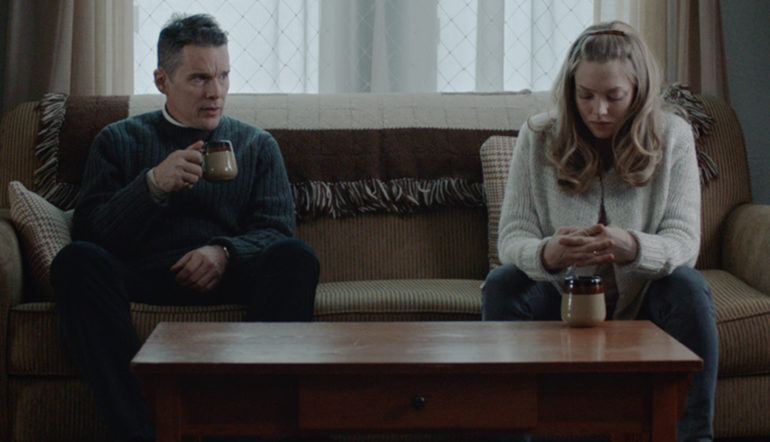“We are hard-pressed on every side, yet not crushed; we are perplexed, but not in despair; persecuted, but not forsaken; struck down, but not destroyed”
– 2 Corinthians 4: 8-9
First Reformed arrives with a peculiar, even shocking sermon to tell. As the right wing of religions and other movements appear to grow louder, and those positioned to oppose such forces find themselves empowered to shout back, First Reformed wanders in like a beaten and bruised stranger looking for a Samaritan, delivering an almighty howl of desperation and frustration. At once sombre and angry, it sees writer/director Paul Schrader’s keenest obsessions and interests distilled into purest cinematic bile. Think Ingmar Bergman’s Taxi Driver; it’s as compelling and terrifying as that sounds.
Calvinist in background, but a devout worshipper of film, Schrader has always kept one eye on the spiritual in his work. Moreover, he’s looked for it in the works of cinema’s masters; he literally wrote the book on religion in film. Looking back, it’s a wonder it’s taken him so long to write a film that grappled with the demands and desires of Christianity directly (Given the hatred it inspired amongst some of the devout, his adaptation of Kazantzakis’ The Last Temptation of Christ probably doesn’t count). As an antidote to the likes of the God’s Not Dead trilogy, First Reformed wrestles with the persistent Christian struggle to find God, rather than arguing for Him blindly. It self-consciously asks why faith allows itself to be ignored when the concerns of religious and atheistic alike seem to coalesce far more than either side might care to admit. In the middle of the summer of The Avengers: Infinity War and Jurassic World: Fallen Kingdom, this is cinematic counter-programming at its most pointed.
The demure front to the slowly bubbling anger at the heart of First Reformed is the church of the same name, a wooden whitewashed historical marker in upstate New York which sees more income from its gift shop than from the collection plate passed around its meagre congregation. Ministering to this humble flock is Reverend Toller, a role that sees Ethan Hawke masterfully leave aside the charm that seduced Julie Delpy in the Before trilogy, leaving only a husk of despair and doubt. Between the death of his son in the military, his subsequent divorce, the seeming futility of his ministry, and apparent alcoholism, Toller is slowly succumbing to the weight of his cross. The comparisons between Toller and similar characters in Bergman’s Winter Light and Robert Bresson’s Diary of a Country Priest are inevitable, but then this is a vision from the man who created Travis Bickle. It can only stay restrained for so long. Both Schrader and Bresson’s protagonists keep a journal, but their journeys feel doomed to end differently from the start.
The inevitable shake-up Toller receives can’t help but feel heaven-sent, namely a young pregnant woman named Mary. In the role of Mary, one of Toller’s parishoners, Amanda Seyfried determinedly eschews the lighter fare and darker oddities of her earlier career in a role that’s at once caring and despairing. Her environmentalist husband Michael (Philip Ettinger) is seriously questioning the wisdom of bringing a child into a world on the cusp of ecological catastrophe, and Mary urges Toller to counsel him. An early extended dialogue between Michael and Toller is told in restrained wide shots and soul-seeking close-ups. Captured in a focused and rigorous 1.37:1 aspect ratio by DoP Alexander Dynan, Schrader confronts the despair of the modern world in a style befitting his transcendental icons like Dreyer or Ozu, as if to say humanity’s woes can change their shape, but despair is universal.
Rather than changing Michael’s mind, Toller starts to find himself coming round to Michael’s point of view. Impending crises, both environmental and personal, seem to galvanize Toller. His frustrations at First Reformed’s parent church Abundant Life and its leader Pastor Jeffers (Cedric Kyles) begin to find a voice, especially when Toller gets wind of both churches getting sponsorship from major polluters. As Hawke skilfully navigates Toller’s downard spiral, Schrader gradually builds tension through sparse sound design and calculated camera moves. The immediate thrill comes from the possibility of either protagonist or film going full Taxi Driver by the end, but the searing imagery and thorny thematics are what linger. Witness what happens when Toller pours pepto-bismol into whiskey, a shot that echoes Travis eyeing up his fizzing alka-seltzer in Taxi Driver.
The supports in First Reformed are uniformly superb, from Seyfried and Kyles (the erstwhile Cedric the Entertainer proving equally compelling in dramatic mode), to Ettinger and Victoria Hill (In the role of Toller’s confidant/paramour, Hill is granted no less than two of the most heartbreaking scenes in recent film, and she’s magnificent). And yet, this is primarily the vision of two men who throw their all at their art. Hawke has never been better, and Schrader has not let the financial and distribution follies of Dominion or Dying Of The Light sour him. This film, his finest since Mishima: A Life In Four Chapters, teems with vitality and vim. There are a couple of moments when Toller finds hope and joy in amongst his darkness, and Schrader allows his camera and imagery to run wild. This will either be epiphany or annoyance to the people who were watching closely, but then Schrader isn’t claiming to have all the answers. Like other recent crises of faith in film (Think A Serious Man or The Master), First Reformed posits faith as something that has to go beyond a humble chapel, a darkened rectory or a gleaming megachurch. Is it God? Our natural world? Or something else entirely? Whatever it is, Schrader urges us to hold on to it at all costs.

